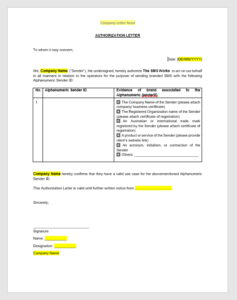Rules for sending business SMS to Australia
Unlike sending messages to the UK mobile numbers, sending business SMS messages to Australian mobile numbers requires strict adherence to regulations set by the Australian Communications and Media Authority (ACMA)
Senders need to comply with all the relevant privacy and data protection regulations.
Registration of sender IDs is required
In order to send messages to Australia, you need to register the sender IDs that you intend to use on your messages. The sender ID is who the message is from and can be between 3 and 11 alphanumeric characters.
The sender ID registration process requires you to complete a short form that lists the sender IDs that you intend to use as well as providing evidence that you are authorised to send SMS from that particular brand.

You also need to provide evidence that you own the brand that is associated with the sender ID.
How long does the registration process take?
Registration and authorisation for sender IDs takes between 1 and 4 weeks.
You will be notified by email by The SMS Works teams as soon as this has happened.
How do I start the process of registering sender IDs for sending to Australia?
Send a brief email to [email protected] requesting the Australian sender ID registration form.
Can I change of add sender Ids at a later date?
No. If you want to add new sender IDs or amend existing ones, you need to repeat the registration process.
What happens if I try to send a text using a sender ID that has nor been approved?
Your text will simply not be sent and unfortunately you’ll be charged the relevant number of credits for the attempt.
Other regulations
As well as registering sender IDs, businesses are also required to adhere to the following rules
Consent Requirement:
Businesses must obtain express or inferred consent before sending SMS messages to individuals. Express consent involves a direct agreement from the recipient, such as checking an opt-in box.
Inferred consent may arise from an existing business relationship where the recipient has shown interest in similar communications.
Identification:
Each SMS must clearly identify the sender.
The business name or a registered trading name should be included in the message to avoid confusion.
Opt-out Mechanism:
All marketing SMS messages must provide a simple and functional opt-out method.
Common opt-out methods include replying with “STOP” or a link to unsubscribe.
Opt-out requests must be honoured promptly.
Message Content Restrictions:
Messages must be truthful and not misleading.
Unsolicited messages promoting goods or services without consent are prohibited.
Time Restrictions:
While there is no legally mandated time restriction, sending messages during reasonable hours is recommended to avoid complaints.
Privacy Compliance:
The Privacy Act 1988 and the Australian Privacy Principles (APPs) regulate how businesses handle personal information.
SMS campaigns must protect personal data and avoid sharing information without consent.
Record Keeping:
Maintain records of consent, message content, and opt-out requests for accountability and potential audits.
Penalties for Non-Compliance: Non-compliance with SMS marketing regulations can result in significant fines issued by the ACMA, with penalties reaching millions for serious breaches.

Best Practices for Compliance
Use reputable SMS marketing platforms like the one The SMS Works provides!
Regularly update consent lists.
Train staff on regulatory requirements.
By following these rules, businesses can ensure legal compliance while maintaining effective and respectful communication with their audience.
Related Articles
Is the registration of SMS sender IDs needed before you can send texts to UK mobile numbers?

